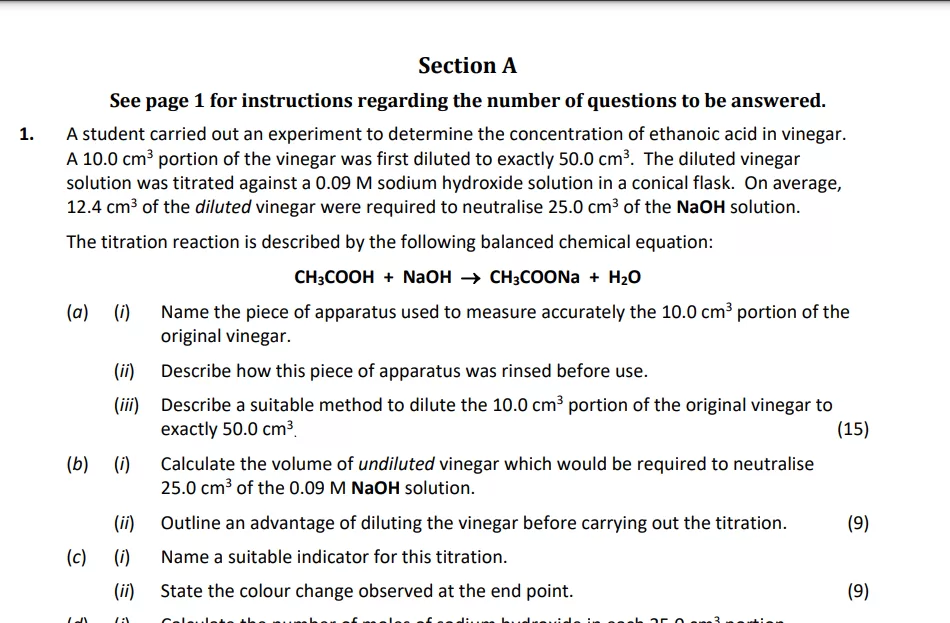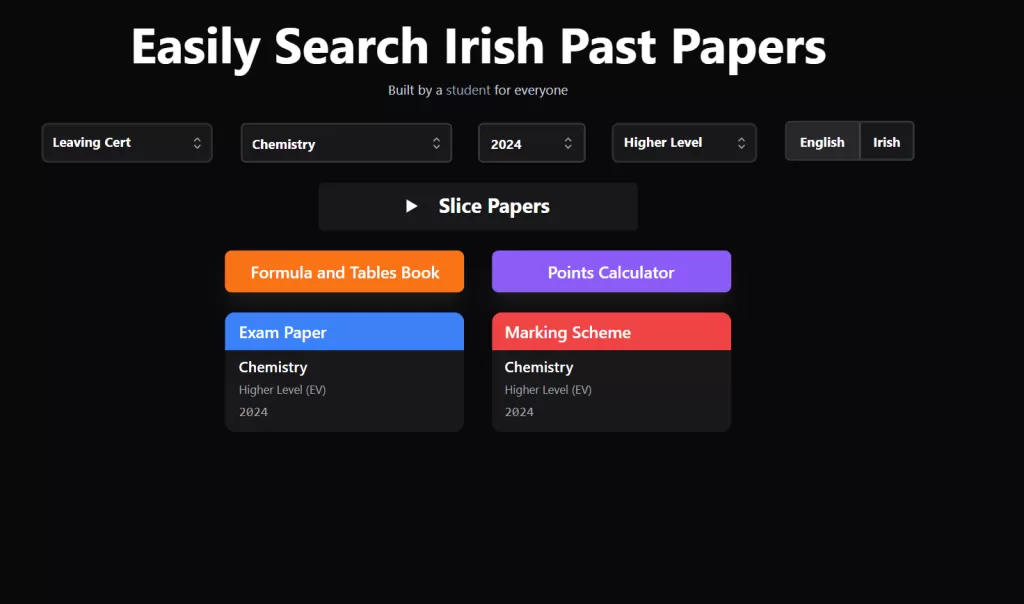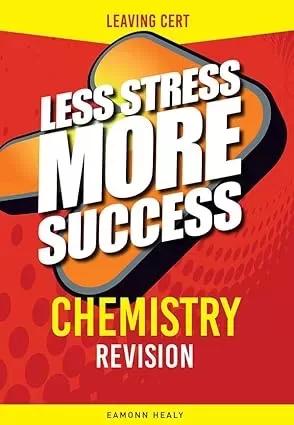Chemistry is a tough subject. There are a lot of components to the exam, which makes knowing all of them inside-out extremely challenging. But not impossible, In this article I will share how I got a H1 in Chemistry in my Leaving Certificate (2024).
Hopefully, this article will help you get the H1 too! Keep reading to find out the slight nuances, and how to give an examiner reasons to give you marks.

How to get a H1 in Chemistry:
Getting a H1 in Chemistry first involves knowing every aspect of the paper, and what to expect before going into the exam.
The paper has 2 sections – the experiment section and the long questions.
The Experiment Section
Q1, 2 and 3 are the expt section.
You have to answer at least 2/3 questions. Now, this section is perfect for scoring high marks in. The questions are mostly repeats of previous years.
If you have done every expt question to have come up since 2002, and fully understand the theory, getting the H1 becomes much easy.
Personal: I never liked Q3s, since they came up from the less focused-on chapters. I still studied for them, but made sure I’m fully confident with the titrations (Q1), and the organic chemistr experiments (Q2). Make a plan before going into the exam!
Pro tip: Q1 was a question I went into the exam knowing I will answer. It is the most predicatable question on the paper. The questions are always the same – theory — procedure — calculation. Make sure to ace this.

Long Questions
This section comprises of the rest of the paper.
Every question examines particular chapters. For example, Question 5 tends to be atomic theory, question 6 tends to examine fuels etc.
Personal: I made sure to have Q4 (short questions), Q5, Q6, Q8 (tends to be oragnic chemistry) and chemical equilibrium (tends to always come up in some way) in my arsenal. I studied these topics extensively and made sure I can answer every past paper question on them.
Pro tip: Make sure you know the chapters each question examines, and then study accordingly.
Focus on timing:
Timing is a crucial aspect of any Leaving Cert exam. Chemistry is no different.
A good rule of thumb is that if a question is 50 marks, spend 22.5 minutes doing that. This is what I always followed. If you finish a question early, use that extra time in other questions, or checking everything
Pro tip: I would recommend going slow when doing the calculations. A single mistake, and every subsequent part is wrong. Take your time. To make up for that, be quick with the theory and definitions.
Pro tip 2: Once you have finished, make sure to check the entire paper again for silly mistakes!
Work with exam papers and marking schemes:
Doing exam questions is the biggest part of studying for Chemistry. In 6th year, after Christmas all I did was exam question after exam question.
In order to get the H1, you need to have practised almost all past paper questions out there, because concepts (and sometimes whole questions) will be repeated. That’s my experience.
Do exam questions chapter wise. Here are the best Leaving Certificate resources to help you with acing past paper questions, and getting the most out of your study.
Pro tip: Make sure you cross-check your answer with the marking scheme too. Answer questions keeping in mind how they will be marked!

Less Stress more Success:
The ‘Less Stress more Success’ books are brilliant for revision. These books consolidate everything you need to know about the subject in just a few pages.
These are particularly useful closer to exam times. I used these books for all the subjects.
I found the chemistry edition to be extremely useful. I highly recommend buying it.
How to use this book effectively?
Use this book to nail down the concepts. The puporse of this book is to help you understand the chapter.

Frequently Asked Questions (FAQs)
Is there a lot of theory you need to know?
Theory is the biggest part of the exam. You can’t shy away from that. But in recent years, there has been a shift from memorising concepts, to actually applying them.
You need to fully understand the concept in order to answer the questions. There is a component of memorisation – especially in definitions – but the focus has shifted to being able to apply your knowledge in practically worded questions.
Know the concepts inside-out. Understand, not memorise.
Do you need to be good at maths to do good in Chemistry?
Absolutely not. The calculations that come up in HL Chemistry are quite straight-forward, from mathematics point of view. It is just basic multiplication and percentages.
Can you skip chapters?
The course is massive, so covering everything is difficult.
I personally left out the options. I didn’t like that. I also left out electro-chemistry. This worked out in my favour, since there were tons of other options.
So YES, you can leave out certain chapters. But keep in mind, this will reduce your options. If you are going to leave chapters out, make sure that you study the other chapters thoroughly. Make a plan and then decide which chapters are you comfortable leaving out.
This is a risky move that I will leave to your better judgement. I only left out chapters that came up as a half questions in Q10 and Q11.
Do definitions need to be precise?
Your definitions must be exactly what they look for in the marking scheme. If the word is singular in the marking scheme, and you write it as a plural, that’s 3 marks gone.
The examiners are EXTREMELY PICKY when it comes to definitions and having the right wording. That’s why I emphasised the importance of working with exam papers and the marking schemes
“Be very careful with your use of language and know your definitions.”
Tara Lyons – Chemistry Teacher at the Institute of Education
How many questions do you need to answer?
There are 11 questions in total. 8 must be answered. In normal years (non-covid), you are expected to answer at least 2 questions from section 1 (the experiment section).
The entire paper is worth 400 marks.
Do you need to be good at drawing graphs?
Not many questions involve drawing graphs, but they do come up from time to time.
Note: Your graph must be near perfect to be awarded full marks. They are very picky about what’s acceptable and what isn’t. You need to check the marking scheme to make sure your graph is of the H1 standard
Should I do extra questions?
I did do an extra question in the Leaving Certificate. I had ample time, and I had checked over everything. But, once I got my results, I noticed that the extra questions didn’t gain me any extra marks. The first 8 questions I did were my best.
Doing an extra question tends to not improve your grade, because you chose your best 8 for a reason.
Conclusion:
Getting the H1 in Chemistry is very difficult. But, with a strong plan and hard-work, it is very doable. Remember this, you need to give the examiner a reason to give you marks. Learn the marking scheme and know every concept backwards.
Don’t give the examiner the opportunity to question your knowledge. The H1 will be yours.
I hope you found this article useful. Good Luck!
Post Disclaimer
The information contained in this post is for general information purposes only. The information is provided by How to get a H1 in Chemistry and while we endeavour to keep the information up to date and correct, we make no representations or warranties of any kind, express or implied, about the completeness, accuracy, reliability, suitability or availability with respect to the website or the information, products, services, or related graphics contained on the post for any purpose.



